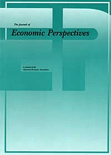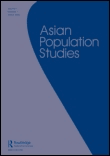
Journal of Demographic Economics
metrics 2024
Shaping Policy with Rigorous Demographic Analysis
Introduction
The Journal of Demographic Economics, published by Cambridge University Press, stands as a leading interdisciplinary platform dedicated to the exploration and advancement of research in the intertwined fields of demography, economics, and geography. With an impact factor that reflects its esteemed position—ranking in the Q1 quartile for Demography (2023)—the journal fosters scholarly dialogue through high-quality articles that elucidate the complex interactions between population dynamics and economic trends. Operating under an open access model, the journal ensures that its findings are widely accessible, promoting inclusivity and engagement among researchers, professionals, and students alike. The Journal of Demographic Economics endeavors to bridge gaps in knowledge by publishing innovative and rigorous studies, thereby contributing significantly to both theoretical frameworks and practical applications across various domains. Drawing submissions from a global audience, this journal not only enhances the understanding of demographic transitions but also informs policy decisions and socioeconomic development strategies, making it an essential resource for those invested in demographic and economic research.
Metrics 2024
 0.62
0.62 1.30
1.30 1.40
1.40 15
15Metrics History
Rank 2024
Scopus
IF (Web Of Science)
JCI (Web Of Science)
Quartile History
Similar Journals

Comparative Population Studies
Unveiling the patterns of human populations across borders.Comparative Population Studies is an esteemed open-access journal published by the BUNDESINSTITUT BEVOELKERUNGSFORSCHUNG in Germany, dedicated to advancing the field of demography. Since its launch and transition to open access in 2010, the journal has provided a platform for researchers to share innovative population studies, promoting a deeper understanding of demographic trends and patterns globally. With an impressive Q2 rank in Demography within the 2023 quartile categories and a commendable rank #61 out of 139 in Scopus' Social Sciences Demography classification, it plays a vital role in disseminating rigorous research. The journal covers a range of topics related to population dynamics, migration, and social implications, making it invaluable to academics, professionals, and students in the field. With an emphasis on comparative studies, Comparative Population Studies not only fosters scholarly dialogue but also enhances policy-making and economic planning. Located at Friedrich-Ebert-Allee 4, Wiesbaden 65185, Germany, the journal continues to be a prominent resource for those eager to engage with the latest demographic research.

Regional Statistics
Charting the Course of Regional DevelopmentRegional Statistics, published by the Hungarian Central Statistical Office, is a leading scholarly journal that plays a pivotal role in enhancing the understanding of regional development and statistical analysis. With its ISSN 2063-9538 and E-ISSN 2064-8243, this open-access journal contributes significantly to various fields, including Cultural Studies, Economics, Geography, and Public Administration. The journal has established itself with impressive Scopus rankings, placing it in the top percentiles across multiple categories, evidencing its high-quality research outputs. Covering converged years from 2015 to 2024, Regional Statistics publishes insightful articles that address pressing regional issues, making it an invaluable resource for researchers, professionals, and students alike who are interested in the quantitative dimensions of society. With a reputation bolstered by its Q1 and Q2 categorizations in various disciplines, this journal is not only committed to advancing statistical knowledge but also to fostering interdisciplinary dialogue among statisticians, policymakers, and social scientists.

POPULATION RESEARCH AND POLICY REVIEW
Advancing Knowledge in Demography and GovernancePopulation Research and Policy Review is a prestigious journal published by Springer, specializing in the fields of demography and policy analysis. Established in 1982, this journal has developed a significant reputation within the academic community, currently holding a Q1 ranking in Demography and a Q2 ranking in Management, Monitoring, Policy, and Law as of 2023. With a robust Scopus ranking of #34 out of 139 in Demography and a readership that spans multiple disciplines, this journal serves as a critical platform for researchers, professionals, and policymakers to disseminate their findings and insights related to population dynamics and policy implications. Although not an open-access journal, Population Research and Policy Review provides vital research that influences both theoretical frameworks and practical applications in social sciences and environmental management. The journal’s ongoing commitment to high-quality, peer-reviewed scholarship makes it an indispensable resource for those seeking to understand and address contemporary demographic challenges.

MONTHLY LABOR REVIEW
Innovating Perspectives on Labor RelationsMONTHLY LABOR REVIEW is a distinguished journal published by LEGAL BOOKS DEPOT, focusing on the dynamic intersections of management, human resources, and innovation within the workforce. Established in the United States, this prominent journal offers insights drawn from a rich history of coverage dating back to 1945, although its Scopus indexing has seen modifications over the years, with the most recent coverage discontinuation in 2021. With a current category quartile ranking of Q3 in Management of Technology and Innovation, Organizational Behavior and Human Resource Management, and Strategy and Management, the journal is positioned within the competitive landscape of business and management research. The Scopus rankings further emphasize its relevance, ranking in the 34th percentile for Organizational Behavior and Human Resource Management, and the 33rd percentile for both Strategy and Management fields. Researchers, professionals, and students seeking to explore the evolving trends in labor relations and workforce innovation will find this journal an invaluable resource for scholarly articles and practical insights that contribute to the field.

Journal of the Economics of Ageing
Exploring the Economic Dimensions of AgeingJournal of the Economics of Ageing, published by ELSEVIER, is a leading international journal dedicated to exploring the economic aspects of ageing in the global context. With an ISSN of 2212-828X, it aims to provide a platform for innovative research that addresses the socio-economic implications of demographic shifts, particularly those related to life-span and life-course studies. Since its inception in 2013, the journal has rapidly established itself within the Q2 category in both the Economics and Econometrics and Life-span and Life-course Studies fields, reflecting its significant contribution to these disciplines. Based in the Netherlands, this journal is indexed with a respectable percentile ranking, such as 69th in Life-span and Life-course Studies, confirming its value to researchers and professionals alike. Committed to disseminating impactful research, the Journal of the Economics of Ageing ultimately seeks to influence policy and funding decisions that shape the future of ageing populations.

Spatial Demography
Transforming Understanding of Demographic TrendsSpatial Demography is a vital academic journal published by Springer International Publishing AG, focusing on the intersection of spatial analysis and demographic research. With its ISSN 2364-2289 and E-ISSN 2164-7070, this journal aims to advance understanding of population dynamics through innovative methodologies and spatially explicit data, offering a platform for researchers, professionals, and students engaged in demography, geography, and urban studies. While it does not currently operate under an open access model, Spatial Demography maintains a rigorous peer-review process to ensure high-quality publications that contribute significantly to the field. Given the growing importance of spatial data in demographic research, the journal serves as an essential resource for those looking to explore how spatial attributes influence demographic processes and patterns worldwide. The official address of the publisher is Gewerbestrasse 11, Cham CH-6330, Switzerland.

JOURNAL OF ECONOMIC PERSPECTIVES
Illuminating Economic Insights for Tomorrow's LeadersJOURNAL OF ECONOMIC PERSPECTIVES, published by the American Economic Association, is a leading academic journal that serves as a vital resource for researchers, professionals, and students in the fields of economics and econometrics. With an impressive impact factor, it ranks in the top Q1 quartile according to the 2023 statistics, demonstrating its significant influence and contribution to the discipline, particularly with a notable Scopus Rank of #21 out of 716 in the category of Economics and Econometrics. Spanning from 1992 to 2024, the journal provides a platform for rigorous and comprehensive analyses that illuminate contemporary economic issues and perspectives. While it does not currently offer open access options, its thorough and insightful content ensures it remains a respected and essential part of economic literature, addressing a diverse array of topics that resonate with the academic community.

Asian Population Studies
Transforming Understanding of Asia's Demographic ChallengesAsian Population Studies is a distinguished journal published by Routledge Journals, Taylor & Francis Ltd, delivering comprehensive insights into the vibrant field of demography. Since its inception in 2006, this peer-reviewed journal has consistently provided a platform for high-quality research that enhances our understanding of population dynamics in Asia. With an impressive category ranking of Q2 in Demography for 2023, and holding a notable position as 35th out of 139 within the Scopus ranking, it is recognized for its significant contributions to the field, appealing to researchers, scholars, and professionals alike. The journal covers a diverse range of topics, including population growth, migration patterns, and socio-economic factors influencing demographic changes across Asian countries. Although it does not offer open access, Asian Population Studies remains a vital resource for those seeking to explore demographic trends and their implications for policy and practice in one of the most populous regions of the world. With a commitment to academic excellence, it continues to serve as an essential tool for anyone engaged in demographic research and study.

GENUS
Exploring the Pulse of Society Through DemographyGENUS is a prestigious open-access journal published by SpringerNature, dedicated to advancing research in the field of demography. With an E-ISSN of 2035-5556, it has been operating as an open-access platform since 2016, ensuring that valuable demographic knowledge is accessible to a global audience. Located in Switzerland, this journal contributes significantly to the scholarly community, achieving a remarkable Q1 ranking in the 2023 Scopus category for Social Sciences focusing on Demography, where it stands at an impressive Rank #12 out of 139, placing it in the 91st percentile. With a history that spans several decades, starting from 1970 and including comprehensive coverage from 2007 to 2024, GENUS provides a vital forum for researchers, professionals, and students seeking to engage deeply with current demographic studies. This journal not only publishes cutting-edge research but also facilitates fruitful discussions on key demographic trends and policies, making it an essential resource for anyone interested in the social sciences.

ECONOMIST-NETHERLANDS
Connecting Economists Through High-Quality ResearchThe Economist-Netherlands, published by Springer, is a prestigious journal that has been a cornerstone in the field of economics since its inception in 1852. With a strong focus on disseminating high-quality research and insights, this journal serves as an essential resource for economists, researchers, and practitioners interested in the dynamic landscape of economic theory and applications. Currently ranked in the Q3 category in Economics and Econometrics, this journal demonstrates a commitment to scholarly rigor, as reflected in its Scopus ranking within the 55th percentile. The journal features an extensive scope that encompasses key topics relevant to both historical and contemporary economic challenges, fostering a vibrant academic discourse. While access is not open, the journal remains a vital publication for anyone seeking to advance their knowledge in the economic sector. With an enduring legacy, the Economist-Netherlands continues to contribute significantly to the evolution of economic scholarship.